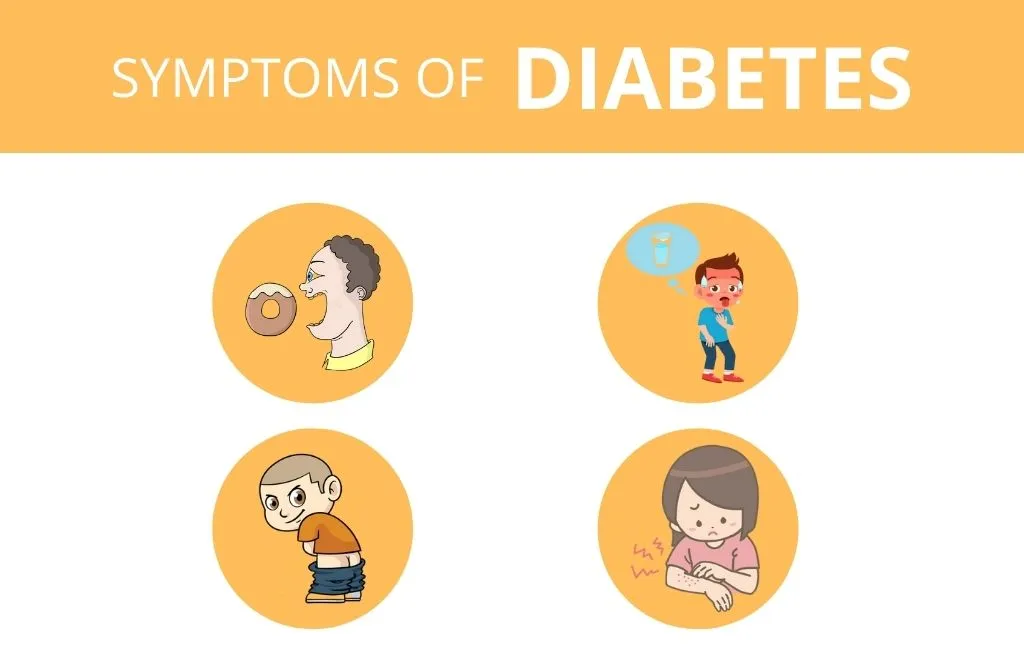Symptoms of Diabetes – How do you tell if you have diabetes? Most early symptoms are when your blood glucose (a type of sugar), is above normal levels. Warning signs can be very mild that you don’t even notice them. This is especially in the case of type 2 diabetes. Some people do not realize it until they have a problem with the long-term damage caused by the disease. In type 1 diabetes, the symptoms usually go away quickly in a few days or a few weeks. They are very serious.
Early Signs and Symptoms of Diabetes
In both types of diabetes, we notice some similar warning signs.
Hunger and fatigue
Your body converts the food you eat into glucose which your cells use for energy. But your cells need insulin to get glucose. If your body doesn’t make enough or no insulin, or your cells are resisting the insulin your body makes, glucose can’t get into cells and you don’t have the energy. This can make you feel more hungry and tired than usual.
Frequent urination and thirst are Symptoms of Diabetes
Generally, a person needs to urinate four to seven times in 24 hours, but people with diabetes may have more urination. Why? Normally, your body absorbs glucose again as it passes through your kidneys. But when diabetes raises your blood sugar, your kidneys can’t bring it all back. This causes more urine in the body and causes fluid retention. Resulting in you having to go more often to urinate. You may feel very thirsty because you urinate a lot. The more you drink, the more you tend to urinate.
Dry Mouth and Itchy Skin are Symptoms of Diabetes
Since your body uses fluids to urinate, there is less moisture for other things. You may get dehydrated and your mouth will feel dry. Dry skin can make you itch.
Blurry Vision are Symptoms of Diabetes
Lenses in your eyes swell as your body fluids change. They change shape and cannot focus.
Symptoms of Type 2 Diabetes
These kinds of symptoms tend to show up after body glucose has been high for a long time.
Slowly Healing Blisters or Cuts are Symptoms of Diabetes
Over time, high blood sugar can affect your blood flow and cause nerve damage that makes it harder for your body to heal wounds.
Yeast Infections are Symptoms of Diabetes
It can affect both men and women with diabetes. Yeast feeds on glucose, so it thrives if there is plenty around. The infection can spread to any warm, moist fold of skin, including the following: between the fingers and toes under the breast or around the genitals.
Pain or Numbness in Your Legs or Feet
This is another consequence of nerve damage.
Symptoms of Type 1 Diabetes
You may notice:
Unintended Weight Loss Symptoms of Diabetes
If your body is not getting energy from your food, it will start burning muscle and fat for energy. You can lose weight even if you do not change your eating habits.
Nausea and Vomiting
When your body starts burning fat, it produces ketones. This can lead to dangerous levels in your blood, which is a potentially life-threatening condition called diabetic ketoacidosis. Ketones can cause stomach upset.
Symptoms of Gestational Diabetes
During pregnancy usually, there are no symptoms of high blood sugar. You may feel a little thirstier than usual or urinate more often.
Warning Signs of Diabetes Complications
In type 2 diabetes we get to see symptoms which may include: itchy skin, slow-healing blisters or cuts (usually surrounding the vagina or thigh area) yeast infections, sudden weight gain, dark skin changes in the neck, armpits, and thighs, called acanthosis negricans. Learn what you can do to reduce the risk of complications such as numbness and tingling in the hands and feet, loss of vision, impotence, or erectile dysfunction (ED).
Hypoglycemia
When your blood sugar or glucose levels are too low to trigger the body, hypoglycemia or low blood sugar occurs. You might think:
Nausea or nervous sweating, chills, impatient, mild headaches, dizziness, Hungry, and sleeping weakness
You may notice:
Fast heartbeat, pale skin, blurred vision, headaches, nightmares or crying when you sleep Coordination problems, Seizures.
Hyperglycaemia,
Hyperglycemia, or high blood sugar, causes several warning signs of diabetes listed above, including heavy thirst, blurred vision, excessive urination, excessive appetite, numbness or tingling, leg fatigue, sugar in your urine, weight loss, and vaginal and skin infections. Blood glucose higher than 180 mg per deciliter (mg/dl)
Diabetic Coma
Its official name is Hyperosmolar Hyperglycemic Nonketotic Syndrome (HHNS). These serious complications can lead to diabetic coma and even death from any type of diabetes, although it is more common in type 2 diabetes. This happens when your blood sugar rises too much 3/4 and your body becomes severely dehydrated. Symptoms include:
Blood sugar over 600 mg/dl Dry, dry mouth Extremely warm, dry skin without sweating High fever (greater than 101 F) Sleep or confusion Loss of vision Illusion Weakness on one side of your body
When to Call Your Doctor
It is important to get tested if you are over 45 or at risk of diabetes. With early detection of your condition, you can avoid nerve damage, heart problems, and other complications. As a general rule, call your doctor if you: are weak and very thirsty, your stomach is sick, urinating a lot, have a stomach ache, breathing deeper and faster than usual, or smell like nail polish remover Is a symptom of high ketones.
Read this article in another language
Watch Video

